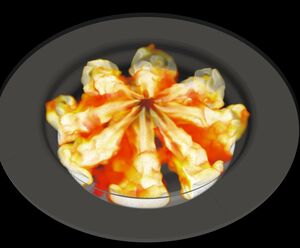Renewable fuels in ICE
Project participants: Mateusz Pucilowski, Siyuan Hu, Leiei Xu, Mark Treacy, Hesam Fatehi, Xue-Song Bai
Background
Internal combustion engine (ICE) is the major power source for vehicles, ships, and many machines, and as of today, 60% of oil is consumed in ICE around the world. Meanwhile, ICE is also the main source of pollutant emission. A large quantity of carbon monoxide (CO), hydrocarbon (HC), nitrogen oxides (NOx), particulate matters (PM, e.g. soot), and greenhouse gases (e.g., carbon dioxide, CO2) are emitted from ICE to the atmosphere. To cope with the emission problem and to develop a sustainable and resource efficient energy system, Sweden has a vision to achieve zero net emission of greenhouse gases to the atmosphere by year 2050. As an intermediate step the Swedish transport sector is aiming to have a vehicle fleet that is independent of fossil fuels by year 2030. To meet these visional goals, research on the use of renewable alternative fuels in ICE is necessary, in particular, considering the current inferiorly high cost of renewable fuels as compared with fossil fuels it is crucially important to develop high-efficiency and clean ICE that is based on renewable alternative fuels. This project is aimed at fundamental studies of the physical and chemical processes in combustion of promising renewable alternative fuels under conditions of ICE, namely, methanol, butanol and bio-diesel, as well as their blends, and based on the fundamental studies to develop strategies of clean and high efficiency ICE using these fuels.
Research goals
Two research goals are set in this project. The first is the characterization of the spray dynamics of methanol, butanol, biodiesel and their potential blends, evaporation, mixing with air, and ignition and combustion under ICE conditions, and based on which development and calibration of sub-grid-scale (SGS) models for large eddy simulation (LES) of the injection of butanol-biodiesel blends under ICE conditions. The second goal is to identify the mechanisms of ignition, turbulence/chemistry interaction, structure and propagation of the reaction fronts of butanol/biodiesel/air combustion with/without exhaust gas recirculation (EGR). DNS and LES will be carried out based on the reduced chemistry developed in sub-goal (a), under generic conditions relevant to ICE.
Recent results

Methanol is an alternative fuel to diesel and gasoline and it can be produced from renewable sources. Methanol combustion generates very low soot. This research project is aimed at developing new engine combustion concepts that are best suitable for methanol. In particular, the focus is on the partially premixed combustion (PPC) engine concept, which employs multiple injections and injection timing to generate stratified charge in the cylinder. By manipulating the charge stratification the combustion heat release rate and combustion temperature can be optimized so that optimal engine efficiency, noise level, and NOx emissions can be achieved.
Methanol combustion under partially premixed combustion (PPC) has been studied using LES and Reynolds averaged Navier-Stokes (RANS) simulations. Numerical studies include investigation of start of injection, multiple injection strategies, kinetic models, spray modeling and piston bowl geometries. It was found that the injection interval to achieve methanol PPC conditions is located closer to top-dead-center compared to other fuels. The high requirement of the intake temperature can be reduced by employing e.g. pilot injections. A combustion mode analysis validated with optical engine experiments showed that due to the cooling effect of methanol, an ignition kernel starts within very fuel lean conditions, and continues as an ignition front propagation towards the fuel rich conditions, consuming the remaining fuel in diffusion flame mode.
Recent Ph.D. theses
Mateusz Pucilowski, Numerical Studies of Methanol PPC Engines and Diesel Sprays. Ph.D. Thesis, Department of Energy Sciences, Lund University, November 2019.
Siyuan Hu, Combustion characteristics of some alternative fuels in ICE: a detailed numerical study, Ph.D. Thesis, Department of Energy Sciences, Lund University, October 2017.
